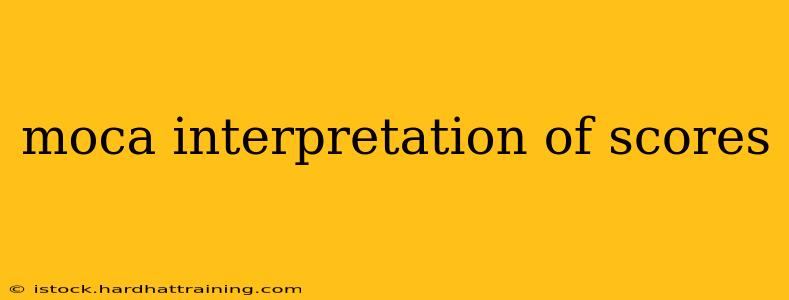The Montreal Cognitive Assessment (MOCA) is a widely used screening tool for mild cognitive impairment (MCI) and dementia. Understanding your MOCA score requires more than just looking at the raw number; it needs context and interpretation. This guide will help you understand what your MOCA score means and what factors influence its interpretation.
What is the MOCA?
The MOCA is a 30-point test assessing different cognitive domains, including:
- Visuospatial/executive: This section evaluates your ability to draw, copy, and visually organize information.
- Naming: Tests your ability to recall the names of common objects.
- Memory: Assesses both immediate and delayed recall of information.
- Attention: Measures your concentration and ability to focus.
- Language: Evaluates your ability to understand and use language.
- Abstraction: Tests your ability to think abstractly and identify relationships between concepts.
- Orientation: Assesses your awareness of time and place.
Interpreting Your MOCA Score
A score of 26 or higher out of 30 is generally considered within the normal range. However, several factors can influence the interpretation:
- Age: The MOCA's scoring may need adjustments depending on your age. Older individuals might naturally score slightly lower. Specific age-related norms should be considered for accurate interpretation.
- Education: Higher levels of education are often associated with higher MOCA scores. This reflects the influence of education on cognitive reserve.
- Culture: The MOCA's design aims for cultural fairness; however, variations in cultural background might subtly affect performance.
- Underlying Medical Conditions: Pre-existing conditions, such as depression, anxiety, or sleep disorders, can negatively impact performance.
Important Note: A single MOCA score alone is insufficient for diagnosis. It serves as a screening tool, not a definitive diagnostic instrument. A low score warrants further investigation through comprehensive neurological assessment by a healthcare professional.
What a Low MOCA Score Might Indicate
A score below 26 may suggest cognitive impairment, potentially indicating:
- Mild Cognitive Impairment (MCI): This is a condition where cognitive decline is more significant than expected for age but doesn't significantly impact daily functioning.
- Dementia: This is a broader term encompassing various conditions characterized by progressive decline in cognitive abilities. Alzheimer's disease is the most common type of dementia.
- Other Neurological Conditions: Several neurological conditions can lead to cognitive deficits, such as stroke, traumatic brain injury, or multiple sclerosis.
Beyond the Numbers: The Importance of a Holistic Assessment
While the MOCA score provides valuable information, healthcare professionals consider various factors beyond just the numerical score. This holistic approach includes:
- Medical History: A complete medical history, including current medications and pre-existing conditions.
- Neurological Examination: A physical examination focusing on neurological function.
- Neuropsychological Testing: Further cognitive testing to provide a more detailed assessment of specific cognitive domains.
- Imaging Studies: Brain imaging techniques (e.g., MRI, CT scan) may be used to rule out structural abnormalities.
Conclusion: Understanding Your Cognitive Health
The MOCA is a useful tool for screening cognitive function, but it's crucial to remember that it's just one piece of the puzzle. A low score necessitates a thorough evaluation by a qualified healthcare professional to determine the underlying cause and appropriate management strategies. Don't hesitate to discuss your concerns with your doctor. Early detection and intervention are essential for managing cognitive decline effectively.
